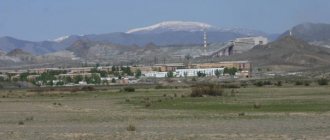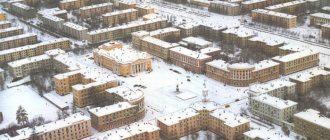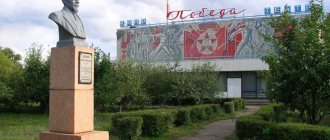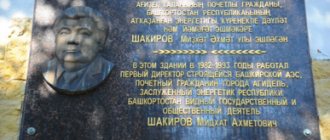This term has other meanings, see Baksan.
This article is about the city. For the urban district, see Baksan Urban District.
| City Baksan Kabard-Cherk. Bakhsen Coat of arms |
| A country | Russia, Russia |
| Subject of the federation | Kabardino-BalkariaKabardino-Balkaria |
| Urban district | Baksan |
| Coordinates | 43°41′00″ n. w. 43°32′00″ E. d. / 43.68333° n. w. 43.53333° E. d. / 43.68333; 43.53333 (G) [www.openstreetmap.org/?mlat=43.68333&mlon=43.53333&zoom=11 (O)] (Z)Coordinates: 43°41′00″ N. w. 43°32′00″ E. d. / 43.68333° n. w. 43.53333° E. d. / 43.68333; 43.53333 (G) [www.openstreetmap.org/?mlat=43.68333&mlon=43.53333&zoom=11 (O)] (I) |
| Head of the city district | Mamkhegov Khachim Khasanovich |
| Based | in the 16th century |
| Former names | until 1920 Kuchmazukino (Kushmezykuey ) before 1960 Old Fortress |
| City with | 1967 |
| Square | 20[1]km² |
| Center height | 455 |
| Climate type | humid moderate (Dfb) |
| Population | ↗37,782[2] people (2016) |
| Density | 1889.1 people/km² |
| National composition | Kabardians, Russians |
| Confessional composition | Sunni Muslims, Orthodox |
| Names of residents | baksanians, baksanets, baksanka |
| Timezone | UTC+3 |
| Telephone code | +7 86634 |
| Postcode | 361 538 |
| Postal codes | 361 530 — 361 535 |
| Vehicle code | 07 |
| OKATO code | [classif.spb.ru/classificators/view/okt.php?st=A&kr=1&kod=83403000000 83 403 000 000] |
| Official site | [baksan.rf/home/1/ rf/home/1/] |
| Precipitation rate | 500—700/year |
| Baksan Moscow |
| Nalchik Baksan |
Audio, photo and video
on Wikimedia Commons
Baksan
(Kabard-Cherk. Bakhsen) is a city of republican significance in Kabardino-Balkaria. Administrative center of the municipalities "Baksan City District" and Baksan District.
Geography
Baksan is located in the northern part of the republic, on the left bank of the Baksan River (Terek basin), at its exit from the gorge onto the plain. Located 20 km north of Nalchik. M 29 runs along the western outskirts of the city.
.
| Distance from Baksan to major cities (by road)[3] | ||||
| NW | Stavropol ~ 260 km Pyatigorsk ~ 58 km | Budennovsk ~ 190 km Novopavlovsk ~ 60 km | Neftekumsk ~ 270 km Mozdok ~ 120 km | NE |
| Z | Kislovodsk ~ 100 km Cherkessk ~ 150 km | Terek ~ 73 km Nartkala ~ 43 km | IN | |
| S-W | Tyrnyauz ~ 64 km Sochi ~ 630 km | Chegem ~ 15 km Nalchik ~ 24 km | Vladikavkaz ~ 130 km Magas ~ 140 km | SE |
The area of the city is 20 km2.
It borders on the lands of settlements: Dygulybgey in the south, Islamey in the southwest, Psychokh in the north, Baksanenok and Kishpek in the east.
The city is located in the foothills zone of the republic. Average altitudes are about 455 meters above sea level. The terrain is mainly foothill sloping plains, characterized by a gentle slope of the terrace to the east in the form of wide hollows and gently sloping slopes. To the southwest of the city the Pasture Ridge begins to rise. The subsoil on the territory of the city is composed of a thick layer of alluvial boulder-pebble rocks with sandy filling of the groundwater, located at a depth of 17-20 meters.
The hydrographic network is represented by the Baksan River basin. To the north of the city streams flow - Khatakum, Mokraya Psarysha, Sukhaya Psarysha and Nevolka. To the west of the city stretches the Baksan-Malka water canal.
The climate is humid and temperate with warm summers and cool winters. The average annual air temperature is about +9.5°C, and ranges from an average of +21.5°C in July to an average of 3.0°C in January. The average daily air temperature ranges from −10°С to +15°С in winter, and from +16°С to +30°С in summer. The average annual precipitation is about 650 mm. In spring, when there are sharp changes in temperature, strong winds blow from the mountains.
Notable natives
People born in Baksan:
- Shogentsukov Ali Askhadovich - poet, writer, founder of modern Kabardian literature.
- Shogentsukov Adam Ogurlievich is a Kabardian poet, prose writer, playwright and publicist.
- Dymov Adam Gafarovich is the founder of the first national printing house and publisher of the first circulated newspaper in the Kabardian language.
- Levchenko Vasily Sidorovich - Hero of the Soviet Union.
- Tutov Zaur Nazhidovich - People's Artist of the Russian Federation and the republics of the KBR, KCHR and Adygea. Minister of Culture of the KBR.
- Mudranov Beslan Zaudinovich - Olympic champion in judo at the 2016 Rio de Janeiro Games.
- Goshokov Arsen Aslanovich is a football player, forward of the Spartak-Nalchik club.
- Bifov Anatoly Zhamalovich - deputy of the State Duma of the Federal Assembly of the Russian Federation of the VI and VII convocations.
Story
In 1822, a Russian military settlement was founded opposite the village of Kuchmazukino, which was part of the Caucasian military line.
In 1825, after the annexation of Kabarda to the Russian Empire, the population of the village of Kuchmazukino, not wanting to recognize the power of the tsarist administration over themselves, moved beyond the Kuban in order to continue the war there with other Circassians.
After the end of the Caucasian War in 1867, the inhabitants of the village of Kuchmazukino moved back to Kabarda and settled east of the military fortification to their previous location.
In 1891, to the west of the military fortification, the Baksan farmstead was founded by immigrants from the Central provinces of the Russian Empire.
In 1920, with the final establishment of Soviet power in Kabarda, by the decision of the Revolutionary Committee of the Nalchik District, Kuchmazukino, like other Kabardian settlements, was renamed due to the presence of princely and noble families in their names. As a result, the village received a new name - Old Fortress.
During the Great Patriotic War, the village and hamlet were occupied by German troops in October 1942. Released in early January 1943. In memory of the fallen soldiers, several monuments have been erected in the city.
In 1960, the village of Staraya Fortress (about 8,000 inhabitants in 1959) and the Baksan farmstead (3,583 inhabitants in 1959) were united into the village of Baksan.
In 1964, the village was given the status of an urban-type settlement.
In 1967, the village was given city status.
In 2003, the village of Dugulubgey was included in the city. After which, on August 8, 2003, Baksan received the status of a city of republican subordination and was transformed into the urban district of the city of Baksan.
In 2008, Dygulybgey was returned to the status of a village within the urban district of the city of Baksan.
Economy
Baksan is an industrially developing city. At the beginning of 2012, more than 423 enterprises of all forms of ownership in the manufacturing sectors operated in the urban district.
Among the large enterprises of the city, there are 12 in the industrial sector, 7 in the construction sector, 4 in the transport and communications sector, and 3 in the agro-industrial complex.
The main budget-generating enterprises are Avtozapchast, Intervain, Victoria-N and Backstrom, which account for more than 70% of the total production of industrial goods.
In November 2016, the construction of the first stage of the Textile Industry LLC textile factory was completed in the city.
Education
- Progymnasium No. 1 - st. Ugnich, 1
- Progymnasium No. 2 - st. Revolutionary, 1
- Progymnasium No. 3 - st. Budyonny, 93
- Secondary school No. 1 - st. Shukova, 1
- Secondary school No. 2 - st. Beslaneeva, 7
- Secondary school No. 3 - st. Krasnoarmeyskaya, 49
- Secondary school No. 4 - st. Panayoti, 177
- Secondary school No. 5 - st. Shukova, 1
- Secondary school No. 6 - st. Ugnich, 2
- Secondary school No. 7 - st. Baksanskaya, 162
- Secondary school No. 8 - st. Apanasova, 65
- Secondary school No. 9 - st. 60th anniversary, 250
- Secondary school No. 10 - st. Ivanova, 9
There are also 7 preschool institutions in the city.
Population
As of January 1, 2022, in terms of population, the city was in 401st place out of 1,115 cities in the Russian Federation.
Density - 1384.45 people/km2.
National composition
According to the 2010 All-Russian Population Census:
Sex and age composition of the population
According to the 2010 All-Russian Population Census:
Men - 17,596 people. (47.7%). Women - 19,264 people. (52.3%).
The average age of the population is 33.2 years. The median age of the population is 30.8 years.
The average age of men is 31.4 years. The median age of men is 29.1 years.
The average age of women is 34.8 years. The median age of women is 32.7 years.
Excerpt characterizing Baksan (city)
- And what a beauty! Thank you, my dear! He took out several gold pieces from his trouser pocket and placed them on her plate. - Well, how are you living? - said Kutuzov, heading towards the room reserved for him. Popadya, smiling with dimples on her rosy face, followed him into the upper room. The adjutant came out to Prince Andrei on the porch and invited him to have breakfast; Half an hour later, Prince Andrei was called again to Kutuzov. Kutuzov was lying on a chair in the same unbuttoned frock coat. He held a French book in his hand and, at Prince Andrei’s entrance, he laid it with a knife and rolled it up. It was “Les chevaliers du Cygne”, the composition of Madame de Genlis [“Knights of the Swan”, Madame de Genlis], as Prince Andrei saw from the wrapper. “Well, sit down, sit here, let’s talk,” said Kutuzov. - It's sad, very sad. But remember, my friend, that I am your father, another father... - Prince Andrei told Kutuzov everything he knew about the death of his father, and about what he saw in the Bald Mountains, driving through them. - What... what have they brought us to! - Kutuzov suddenly said in an excited voice, obviously having clearly imagined, from the story of Prince Andrei, the situation in which Russia was. “Give me time, give me time,” he added with an angry expression on his face and, obviously not wanting to continue this conversation that worried him, said: “I called you to keep you with me.” “I thank your lordship,” answered Prince Andrey, “but I’m afraid that I’m no longer fit for headquarters,” he said with a smile, which Kutuzov noticed. Kutuzov looked at him questioningly. “And most importantly,” added Prince Andrei, “I got used to the regiment, fell in love with the officers, and the people, it seems, loved me.” I would be sorry to leave the regiment. If I refuse the honor of being with you, then believe me... An intelligent, kind and at the same time subtly mocking expression shone on Kutuzov’s plump face. He interrupted Bolkonsky: “I’m sorry, I would need you; but you're right, you're right. This is not where we need people. There are always many advisers, but no people. The regiments wouldn’t be the same if all the advisers served there in regiments like you. “I remember you from Austerlitz... I remember, I remember, I remember you with the banner,” said Kutuzov, and a joyful color rushed into Prince Andrei’s face at this memory. Kutuzov pulled him by the hand, offering him his cheek, and again Prince Andrei saw tears in the old man’s eyes. Although Prince Andrei knew that Kutuzov was weak to tears and that he was now especially caressing him and feeling sorry for him out of a desire to show sympathy for his loss, Prince Andrei was both joyful and flattered by this memory of Austerlitz. - Go your way with God. I know your path is a path of honor. – He paused. “I felt sorry for you in Bukarest: I should have sent you.” - And, changing the conversation, Kutuzov began to talk about the Turkish war and the concluded peace. “Yes, they reproached me a lot,” said Kutuzov, “both for the war and for the peace... but everything came on time.” Tout vient a point a celui qui sait attendre. [Everything comes on time for someone who knows how to wait.] And there were no fewer advisers there than here... - he continued, returning to the advisers who apparently occupied him. - Oh, advisers, advisers! - he said. If we had listened to everyone, we would not have concluded peace there, in Turkey, and we would not have ended the war. Everything is quick, but quick things take a long time. If Kamensky had not died, he would have disappeared. He stormed the fortress with thirty thousand. Taking a fortress is not difficult, but winning a campaign is difficult. And for this you don’t need to storm and attack, but you need patience and time. Kamensky sent soldiers to Rushchuk, and I sent them alone (patience and time) and took more fortresses than Kamensky, and forced the Turks to eat horse meat. – He shook his head. - And the French will be there too! “Believe my word,” said Kutuzov, inspired, hitting himself on the chest, “they will eat my horse meat!” “And again his eyes began to blur with tears. - However, before the battle will have to be accepted? - said Prince Andrei. - It will have to be, if everyone wants it, there is nothing to do... But, my dear: there is nothing stronger than those two warriors, patience and time; they will do everything, but the advisers n'entendent pas de cette oreille, voila le mal. [they don’t hear with this ear—that’s what’s bad.] Some want it, others don’t want it. What to do? – he asked, apparently expecting an answer. - Yes, what do you tell me to do? - he repeated, and his eyes sparkled with a deep, intelligent expression. “I’ll tell you what to do,” he said, since Prince Andrei still did not answer. – I’ll tell you what to do and what I’m doing. Dans le doute, mon cher,” he paused, “abstiens toi, [In doubt, my dear, refrain.],” he said with emphasis. - Well, goodbye, my friend; remember that with all my soul I bear your loss with you and that I am not your Serene Highness, not a prince or commander-in-chief, but I am your father. If you need anything, come straight to me. Goodbye, my dear. “He hugged and kissed him again. And before Prince Andrei even had time to walk out the door, Kutuzov sighed reassuringly and took up Madame Genlis’s unfinished novel “Les chevaliers du Cygne” again. How and why this happened, Prince Andrei could not explain in any way; but after this meeting with Kutuzov, he returned to his regiment reassured about the general course of the matter and about who was entrusted with it. The more he saw the absence of everything personal in this old man, in whom there seemed to be only the habits of passions and instead of the mind (grouping events and drawing conclusions) only the ability to calmly contemplate the course of events, the more calm he was that everything would be as it was. there should be. “He won’t have anything of his own. “He won’t come up with anything, won’t do anything,” thought Prince Andrei, “but he will listen to everything, remember everything, put everything in its place, won’t interfere with anything useful and won’t allow anything harmful.” He understands that there is something stronger and more significant than his will - this is the inevitable course of events, and he knows how to see them, knows how to understand their meaning and, in view of this meaning, knows how to renounce participation in these events, from his personal waves aimed at other. And the main thing,” thought Prince Andrey, “why you believe him, is that he is Russian, despite the novel Zhanlis and French sayings; this is that his voice trembled when he said: “What have they brought to this!”, and that he began to sob, saying that he would “force them to eat horse meat.” It was on this same feeling, which everyone more or less vaguely experienced, that the unanimity and general approval that accompanied the popular election of Kutuzov as commander-in-chief, contrary to court considerations, was based. After the departure of the sovereign from Moscow, Moscow life flowed in the same, usual order, and the course of this life was so ordinary that it was difficult to remember the former days of patriotic enthusiasm and enthusiasm, and it was difficult to believe that Russia was really in danger and that the members of the English Club were together with that, the sons of the fatherland, ready for any sacrifice for him. One thing that was reminiscent of the general enthusiastic patriotic mood that existed during the sovereign’s stay in Moscow was the demand for donations of people and money, which, as soon as they were made, took on a legal, official form and seemed inevitable. As the enemy approached Moscow, the Muscovites’ view of their situation not only did not become more serious, but, on the contrary, became even more frivolous, as is always the case with people who see a great danger approaching. When danger approaches, two voices always speak equally strongly in a person’s soul: one very reasonably says that a person should consider the very nature of the danger and the means to get rid of it; another says even more wisely that it is too difficult and painful to think about danger, whereas it is not in the power of man to foresee everything and save himself from the general course of affairs, and therefore it is better to turn away from the difficult, until it comes, and think about the pleasant. In solitude, a person mostly gives himself to the first voice, in society, on the contrary, to the second. So it was now with the residents of Moscow. It's been a long time since we had as much fun in Moscow as we did this year. Rastopchinsky posters with the image at the top of a drinking house, a kisser and a Moscow tradesman Karpushka Chigirin, who, having been in the warriors and having drunk an extra hook on a poke, heard that Bonaparte wanted to go to Moscow, got angry, scolded all the French with bad words, left the drinking house and spoke under the eagle to the assembled people, read and discussed along with the last burima of Vasily Lvovich Pushkin. In the club, in the corner room, they were going to read these posters, and some liked how Karpushka made fun of the French, saying that they would bloat from cabbage, they would burst from porridge, they would suffocate from cabbage soup, that they were all dwarfs and that one woman would throw a pitchfork at the three of them . Some did not approve of this tone and said that it was vulgar and stupid. They said that Rostopchin expelled the French and even all foreigners from Moscow, that there were spies and agents of Napoleon among them; but they told this mainly in order to convey on this occasion the witty words spoken by Rostopchin upon their departure. The foreigners were sent on a barque to Nizhny, and Rastopchin told them: “Rentrez en vous meme, entrez dans la barque et n'en faites pas une barque ne Charon.” [come into yourself and into this boat and try so that this boat does not become Charon’s boat for you.] They said that they had already expelled all public places from Moscow, and they immediately added Shinshin’s joke that for this alone Moscow should be grateful to Napoleon . They said that his regiment would cost Mamonov eight hundred thousand, that Bezukhov spent even more on his warriors, but that the best thing about Bezukhov’s action was that he himself would dress in a uniform and ride on horseback in front of the regiment and would not take anything for places from those who will look at him. “You’re not doing anyone any favors,” said Julie Drubetskaya, collecting and pressing a pile of plucked lint with thin fingers covered with rings. Julie was getting ready to leave Moscow the next day and was having a farewell party. - Bezukhov is est ridicule [ridiculous], but he is so kind, so sweet. What pleasure is it to be so caustique [evil-tongued]? - Fine! - said a young man in a militia uniform, whom Julie called “mon chevalier” [my knight] and who was traveling with her to Nizhny. In Julie's society, as in many societies in Moscow, it was expected to speak only Russian, and those who made mistakes when speaking French paid a fine in favor of the donations committee. “Another fine for Gallicism,” said the Russian writer who was in the living room. – “The pleasure of being not in Russian. “You don’t do anyone any favors,” Julie continued to the militiaman, not paying attention to the writer’s remark. “I’m to blame for the caustique,” she said, “and I’m crying, but for the pleasure of telling you the truth I’m ready to pay more; I’m not responsible for Gallicisms,” she turned to the writer: “I have neither the money nor the time, like Prince Golitsyn, to take a teacher and study in Russian.” “Here he is,” said Julie. “Quand on... [When.] No, no,” she turned to the militia, “you won’t catch me.” “When they talk about the sun, they see its rays,” said the hostess, smiling kindly at Pierre. “We were only talking about you,” Julie said with the freedom of lies characteristic of secular women. “We said that your regiment will probably be better than Mamonov’s.” “Oh, don’t tell me about my regiment,” answered Pierre, kissing his hostess’s hand and sitting down next to her. - I'm so tired of him! – Surely you will command it yourself? – said Julie, slyly and mockingly exchanging glances with the militiaman. The militiaman in the presence of Pierre was no longer so caustique, and his face expressed bewilderment at what Julie’s smile meant. Despite his absent-mindedness and good nature, Pierre’s personality immediately stopped all attempts at ridicule in his presence.
Notes[ | ]
- General plan of the Baksan urban district
- ↑ 123
The permanent population of the Russian Federation by municipalities as of January 1, 2022 (Russian). Retrieved April 27, 2022. Archived May 2, 2022. - Calculation of distances between cities (undefined)
(inaccessible link). Archived June 23, 2010. - Baksan district 1939
- All-Union Population Census of 1959. Number of rural population of the RSFSR - residents of rural settlements - district centers by gender
- All-Union Population Census of 1970 The size of the urban population of the RSFSR, its territorial units, urban settlements and urban areas by gender. (Russian). Demoscope Weekly. Access date: September 25, 2013. Archived April 28, 2013.
- All-Union Population Census of 1979 The size of the urban population of the RSFSR, its territorial units, urban settlements and urban areas by gender. (Russian). Demoscope Weekly. Access date: September 25, 2013. Archived April 28, 2013.
- All-Union population census of 1989. Urban population (undefined)
. Archived from the original on August 22, 2011. - ↑ 123456789
People's encyclopedia "My City". Baksan (city) - All-Russian population census 2002. Volume. 1, table 4. Population of Russia, federal districts, constituent entities of the Russian Federation, districts, urban settlements, rural settlements - regional centers and rural settlements with a population of 3 thousand or more (unspecified)
. Archived from the original on February 3, 2012. - The size of the permanent population of the Russian Federation by cities, urban-type settlements and regions as of January 1, 2009 (unspecified)
. Retrieved January 2, 2014. Archived January 2, 2014. - Population of the Kabardino-Balkarian Republic by settlement according to the results of the 2010 All-Russian Population Census (unspecified)
(inaccessible link). Access date: September 21, 2014. Archived January 2, 2014. - Population of the Russian Federation by municipalities. Table 35. Estimated resident population as of January 1, 2012 (unspecified)
. Retrieved May 31, 2014. Archived May 31, 2014. - Population of the Russian Federation by municipalities as of January 1, 2013. - M.: Federal State Statistics Service Rosstat, 2013. - 528 p. (Table 33. Population of urban districts, municipal districts, urban and rural settlements, urban settlements, rural settlements) (undefined)
. Retrieved November 16, 2013. Archived November 16, 2013. - Table 33. Population of the Russian Federation by municipalities as of January 1, 2014 (unspecified)
. Access date: August 2, 2014. Archived August 2, 2014. - Population of the Russian Federation by municipalities as of January 1, 2015 (unspecified)
. Access date: August 6, 2015. Archived August 6, 2015. - Population of the Russian Federation by municipalities as of January 1, 2016 (Russian) (October 5, 2018). Retrieved May 15, 2022. Archived May 8, 2022.
- Population of the Russian Federation by municipalities as of January 1, 2022 (Russian) (July 31, 2017). Retrieved July 31, 2022. Archived July 31, 2022.
- Population of the Russian Federation by municipalities as of January 1, 2022 (Russian). Retrieved July 25, 2018. Archived July 26, 2022.
- Population of the Russian Federation by municipalities as of January 1, 2022 (Russian). Retrieved July 31, 2019. Archived May 2, 2022.
- Population of the Russian Federation by municipalities as of January 1, 2022 (Russian). Date accessed: October 17, 2022. Archived October 17, 2022.
- taking into account the cities of Crimea
- https://rosstat.gov.ru/storage/mediabank/bul_Chislen_nasel_MO-01-01-2021.rar Population of the Russian Federation by municipalities as of January 1, 2022 (1.85 Mb, 07/30/2021)
- Volume 3. Table 4. Population by nationality and Russian language proficiency by municipalities and settlements of the KBR (undefined)
(inaccessible link). Date accessed: July 18, 2022. Archived March 6, 2016. - Volume 1. Table 2.2 Population of the CBD by age groups and gender (unspecified)
(inaccessible link). Date accessed: July 18, 2022. Archived October 1, 2022. - Population of the KBR according to the results of the 2010 All-Russian Population Census (unspecified)
(inaccessible link). Retrieved June 12, 2016. Archived June 24, 2016. - Religion. Baksan urban district (undefined)
. - Baksan Urban District: Healthcare (unspecified)
. - Newspaper "Baksan" (undefined)
. - Economy of the city of Baksan (undefined)
. - s OKATO and OKTMO - Baksan (undefined)
. Retrieved March 23, 2022. Archived September 24, 2015.
Local government
Administration of the Baksan urban district - Baksan city, ave. Lenina, 21.
The structure of local government bodies of the municipality is:
- The local administration of the Urban District of the city of Baksan is the executive and administrative body of the district;
- The head of the local administration of the Baksan City District is the head of the executive branch of the district.
- The Local Government Council of the Urban District of the city of Baksan is an elected representative body of the district;
- The Chairman of the Local Government Council of the Urban District of the city of Baksan is the highest official of the district;
Head of the local administration of the city district
- Mamkhegov Khachim Khasanovich ( from June 17, 2015
)
Chairman of the City Local Government Council
- Khapachev Ruslan Gumarovich ( from December 25, 2015
)






